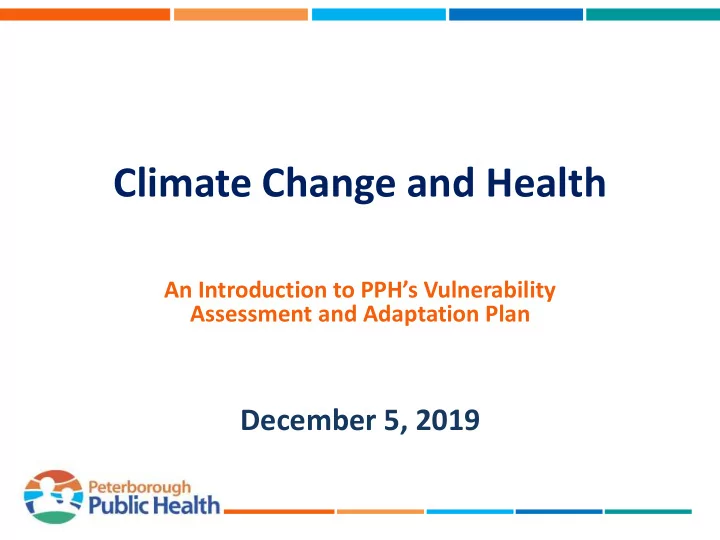

Climate Change and Health An Introduction to PPH’s Vulnerability Assessment and Adaptation Plan December 5, 2019
Ontario Public Health Standards Healthy Environments Program Standard Goal: To reduce exposure to health hazards and promote the development of healthy built and natural environments that support health and mitigate existing and emerging risks, including the impacts of climate change.
OPHS: Healthy Environments and Climate Change Guideline, 2018 Climate Change Adaptation: • Monitor impacts • Conduct assessments on health hazards • Mitigate heat health impacts
Adaptation (Adaptive Capacity) • Measures taken or capacity to reduce the negative effects of climate change, take advantage of the positive effects or cope with consequences Mitigation • Human interventions to reduce the sources of greenhouse gases or enhance their carbon sinks.
Ontario Climate Change and Health Toolkit
Health Hazards • Extreme Temperature • Extreme Weather Events • Air Quality • Foodborne and Waterborne Illness • Vectorborne Disease • Stratospheric Ozone Depletion/UV Rays
The Opinion of Peterborough County and City Residents; RRFSS, 2019 reported being concerned about climate change
• Caption
PPH and Climate Change 2014 - 2015 • A Review of Frameworks Related to Public Health Adaptation to Climate Change and of the Health Impacts of Flooding and Severe Precipitation, 2014 • Application of the Multiple Exposures Multiple Effects Model (MEME) to Four Flood Events in Canada: Lessons Learned for Public Health Adaptation to Extreme Precipitation and Flooding in the Context of Climate Change, 2015 • Climate Change Adaptability Assessment, 2015
PPH and Climate Change 2018 – present • Began planning of Climate Change and Health Vulnerability Adaptation Assessment in September 2018 • A local assessment will: • Improve evidence and understanding of link • Produce evidence on health risks • Identify opportunities to incorporate climate change into policies and programs • Serve as a baseline analysis for monitoring of changes • Create collaborations and partnerships among differing sectors
A Plan for the Community
Who is moving this work forward? Worker Bees • Jocelyn and Monique (Health Promoters) Data Superhero • Sarah (Epidemiologist) Internal Advisory Group • PPH Managers External Advisory Group • Key community partners
Quantitative Information Gathering • Developed a comprehensive indicators list • RRFSS data – general public attitudes and behaviours
Qualitative Information Gathering • Internal team focus groups • Key informant interviews • Health sector focus group • On-line survey for climate change champions
Literature Review Initial focus (now) on: • Extreme Weather Events (Monique) • Extreme Temperature (Jocelyn) • Followed by (2020-2021) food and waterborne illnesses, air quality, vectorborne illnesses and UV exposure.
FOR MORE INFORMATION: Contact Jocelyn and/or Monique • jcorradetti@peterboroughpublichealth.ca • mbeneteau@peterboroughpublichealth.ca
Recommend
More recommend